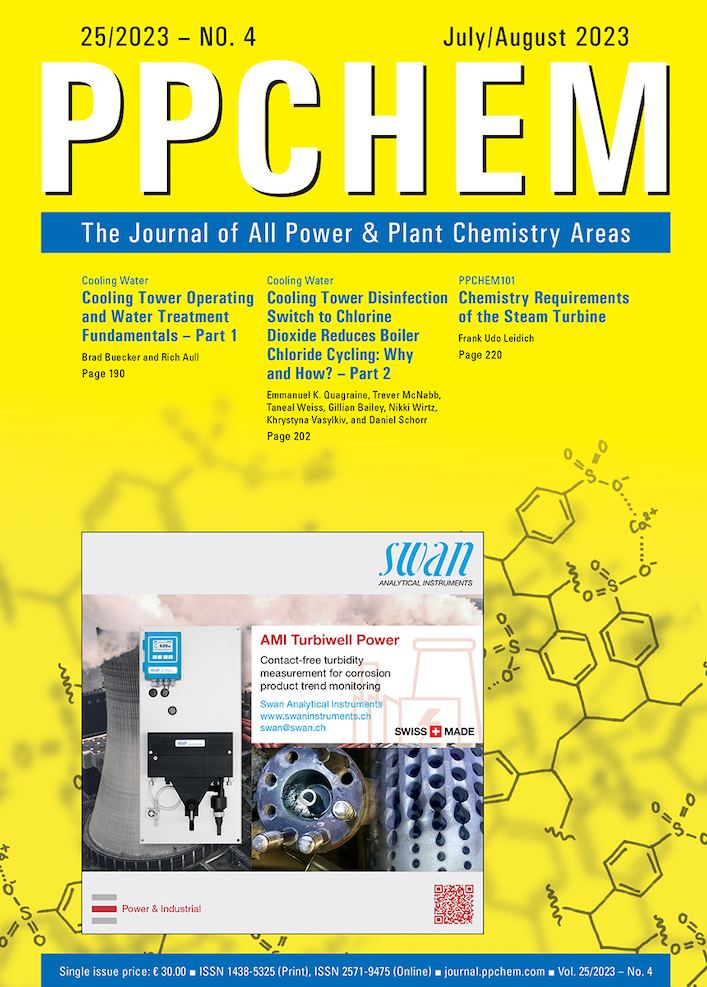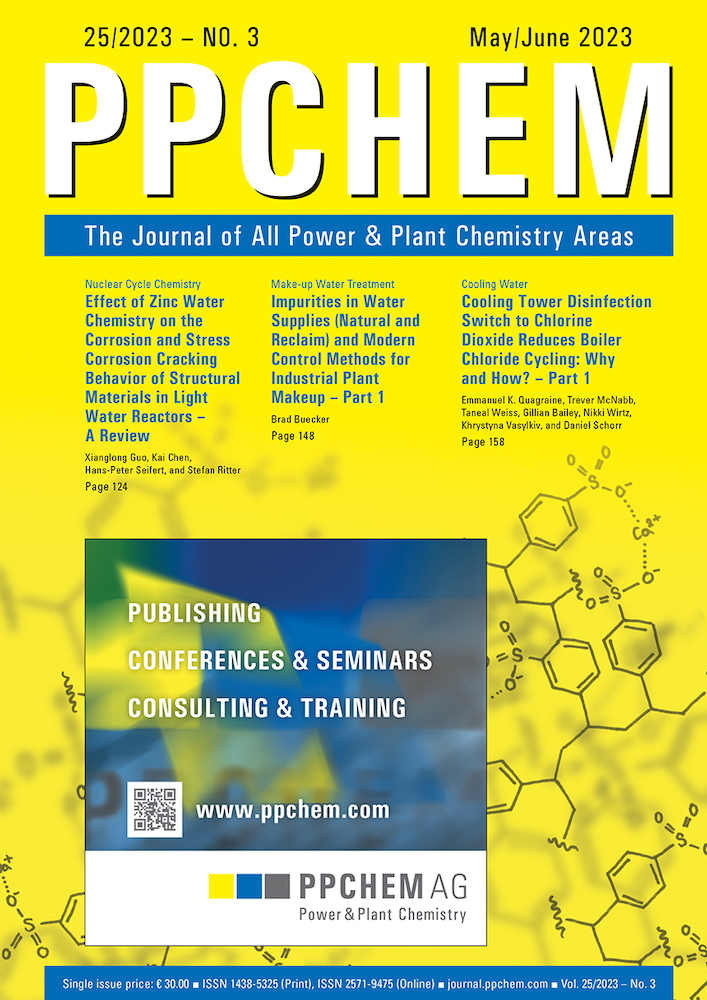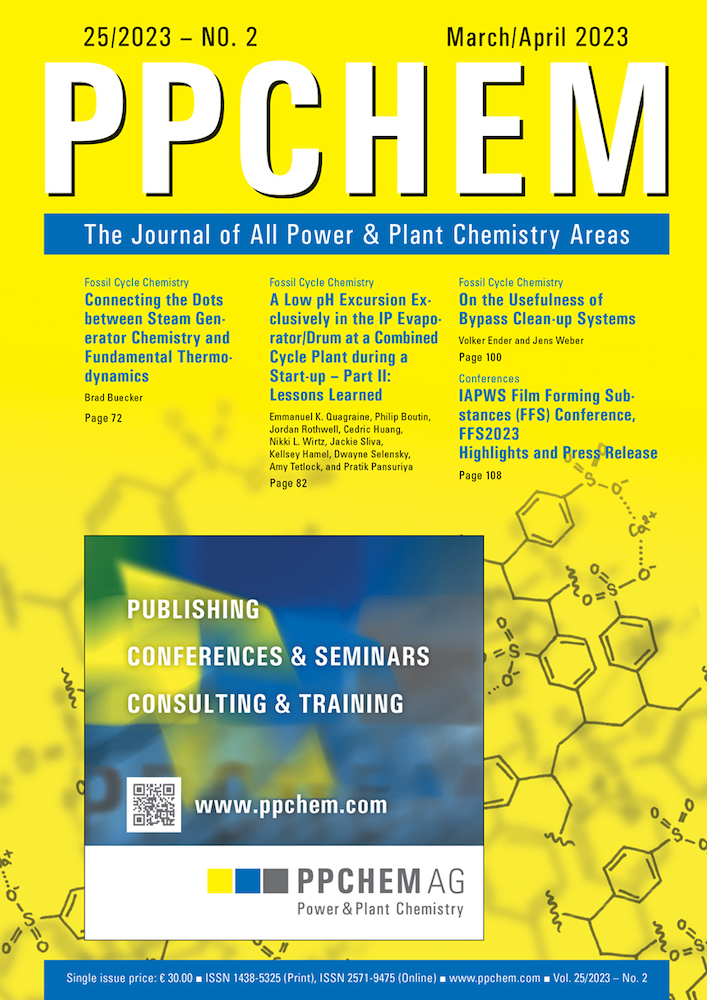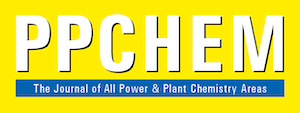Author: anderthalbAdmin
Article – Issue 04 (2023) – Chemistry Requirements of the Steam Turbine
Issue 04 (2023)

For members only
ABSTRACTS
Cooling Tower Operating and Water Treatment Fundamentals – Part 1
Brad Buecker and Rich Aull
Process cooling is an important operational factor in many industrial plants and commercial office buildings around the world. Most of these plants use cooling towers for primary cooling. A large facility may have dozens of towers scattered throughout the premises. Often, plant personnel are focused on process engineering and chemistry, potentially neglecting cooling systems until a serious disruption occurs that threatens plant production or, worse, jeopardizes employee safety.
This article forms the basis of a short series of articles dealing with the chemistry of cooling systems. In this first part of the series, we examine the fundamentals of heat transfer in the cooling tower and the methods that have been developed to improve heat exchange in the tower. Subsequent parts discuss modern water treatment methods to ensure reliable performance.
PPCHEM® 2023, 25(4), 190–198
For Members only
Cooling Tower Disinfection Switch to Chlorine Dioxide Reduces Boiler Chloride Cycling: Why and How? – Part 2
Emmanuel K. Quagraine, Trever McNabb, Taneal Weiss, Gillian Bailey, Nikki Wirtz, Khrystyna Vasylkiv, and Daniel Schorr
This is the second half of a two-part article discussing the abatement of selective boiler chloride cycling (SBCC) upon switching the recirculating cooling water (RCW) biocide from NaOCl to ClO2. The use of ClO2 treatment significantly reduces SBCC, with only sporadic spikes observed to a much lower extent. These spikes are found to be related to the plant’s operation, coinciding with sudden load drops and increased air injector flows. It is suggested that these spikes may be caused by small ClO2(g) residuals condensing at the air injector condenser and entering the feedwater, eventually reducing to chloride ions (Cl–) in the water/steam cycle. Unlike chlorination, ClO2 treatment prevents the formation and persistence of volatile chlorine compounds (VCCs), including ClO2(g). The residual ClO2 in the RCW that is responsible for the highest observed daily boiler chloride rise during ClO2 treatment is estimated to be 4.05–9.74 ⋅ 10–5 mg ⋅ L–1. However, this concentration range represents only 0.02–0.23 % of the highest to the least measured residual concentrations, confirming the previous assertions that maintenance of substantial residual ClO2 in RCW, especially when using treated municipal wastewater as make-up, is unlikely. Overall, the operational data supports the switch from NaOCl to ClO2 as an effective method for reducing SBCC in the water/steam cycle, with ClO2 treatment showing superior performance and minimal VCC formation compared to NaOCl.
PPCHEM® 2023, 25(4), 202–210
For Members only
Chemistry Requirements of the Steam Turbine
Frank Udo Leidich
Safe and trouble-free operation of a steam turbine requires monitoring and control of the operating medium “steam.” In particular, it is necessary to prevent impurities in steam from causing corrosion attacks on turbine components, which, depending on the form of corrosion, can lead to sudden, unpredictable component failure. This PPCHEM 101 describes typical damage and failures that will eventually occur if the quality of the water and steam does not meet the requirements as stated in the operation manual of the steam turbine manufacturer and/or global standards and technical guidance documents as released by, for example, the International Association for the Properties of Water and Steam (IAPWS).
PPCHEM® 2023, 25(4), 220–226
For Members only
ERRATA
Nobody is perfect and everybody makes mistakes sometimes. We apologize to the authors and to our readers for the mistakes in the article:
Effect of Zinc Water Chemistry on the Corrosion and Stress Corrosion Cracking Behavior of Structural Materials in Light Water Reactors – A Review
Xianglong Guo, Kai Chen, Hans-Peter Seifert, and Stefan Ritter
PPCHEM® 2023, 25(3), 124–147
The corrected version of the paper (a PDF file)
is available to all readers here.
The details of the errata can be found in the pdf:
Issue 03 (2023)

For members only
ABSTRACTS
Effect of Zinc Water Chemistry on the Corrosion and Stress Corrosion Cracking Behavior of Structural Materials in Light Water Reactors – A Review
Xianglong Guo, Kai Chen, Hans-Peter Seifert, and Stefan Ritter
Zinc (Zn) injection into light water reactor coolants has attracted increasing attention since the reporting of its positive effects on reducing the susceptibility to stress corrosion cracking (SCC) of steam generator tubes made of Alloy 600. Revealing the corrosion and SCC mechanisms of structural materials exposed to Zn water chemistry (ZWC) has gained importance in quantifying potential benefits for the safe long-term operation of nuclear reactors. This paper reviews the open literature on the current understanding of ZWC effects on the (uniform) corrosion and SCC behavior of structural materials used in western light water reactor plants. Some research with promising results has been conducted, but more detailed and systematic work is still needed to draw meaningful conclusions on the SCC mitigation capabilities of the ZWC.
PPCHEM® 2023, 25(3), 124–147
For Members only
Impurities in Water Supplies (Natural and Reclaim) and Modern Control Methods for Industrial Plant Makeup – Part 1
Brad Buecker
Makeup water for power and industrial plants typically contains numerous impurities. Many come from natural processes, while others, often in slight but at times potentially troublesome amounts, come from human activities. The contaminants can cause fouling, scaling, and other problems in cooling, service, and high-purity makeup systems unless treatment methods are employed to reduce impurity concentrations. This series examines how impurities enter water supplies, and it provides an overview of modern treatment methods.
PPCHEM® 2023, 25(3), 148–154
For Members only
Cooling Tower Disinfection Switch to Chlorine Dioxide Reduces Boiler Chloride Cycling: Why and How? – Part 1
Emmanuel K. Quagraine, Trever McNabb, Taneal Weiss, Gillian Bailey, Nikki Wirtz, Khrystyna Vasylkiv, and Daniel Schorr
This is the first half of a two-part article which discusses the abatement of selective boiler chloride cycling (SBCC), which has plagued the subject power plant, upon switching the recirculating cooling water (RCW) biocide from NaOCl to ClO2. Evidence has been given to attribute this mainly to gaseous ingress of volatile chlorinated compounds (VCCs) through weak tube-to-tubesheet joints. Based on Henry’s constants in aqueous solutions, ClO2 partitions more into the gaseous phase compared to chlorine species associated with NaOCl, i.e., chloramines, Cl2, HOCl, and OCl–. The SBCC abatement hence seems paradoxical. Based on literature and operational data, this is explained. Properties of ClO2 make keeping residual ClO2 in RCW difficult, if not impractical. At the cooling tower, major losses occur physically and chemically and even when residual remains, its high solubility in water at such low concentrations causes deviation from Henry’s law, i.e., a lower tendency to form ClO2(g). In addition, inside the condenser, where ClO2(g) may occur, it reacts quickly with oxidizable gases and (bio)organic compounds selectively yet versatilely, where it is not only consumed but avoids formation of VCCs, thereby preventing their ingress into the condensate side.
PPCHEM® 2023, 25(3), 158–174
For Members only
ERRATA
Nobody is perfect and everybody makes mistakes sometimes. We apologize to the authors and to our readers for the mistakes in these articles:
On the Usefulness of Bypass Clean-up Systems
Volker Ender and Jens Weber
PPCHEM® 2023, 25(2), 100–105
The corrected version of the paper (a PDF file)
is available to all readers here.
The details of the errata can be found in the pdf:
Some Basics of Power Plant Chemistry – Corrosion and Deposition
Frank Udo Leidich
PPCHEM® 2023, 25(1), 38–50
The corrected version of the paper (a PDF file)
is available to all readers here.
The details of the errata can be found in the pdf:
Article – Issue 03 (2023) — Cooling Tower Disinfection Switch to Chlorino Doixide Reduces Boiler Chloride Cycling: Why and How? — Part 1
Article – Issue 03 (2020) – Impurities in Water Supplies (Natural and Reclaim) and Modern Control Methods for Industrial Plant Makeup – Part 1
Article – Issue 03 (2023) – Effect of Zinc Water Chemistry on the Corrosion and Stress Corrosion Cracking Behavior of Structural Materials in Light Water Reactors – A Review
E-Paper – Issue 03 (2023)
Issue 02 (2023)

For members only
ABSTRACTS
Connecting the Dots between Steam Generator Chemistry and Fundamental Thermodynamics
Brad Buecker
Experience has shown the importance of the necessity of comprehending the thermodynamics of steam generator heat transfer to better understand the chemistry requirements. Besides the corrosion aspects of water- and steam-side impurity ingress, efficiency losses can be expensive.
To minimize efficiency losses, condenser performance should be monitored diligently and it must be ensured that cooling water chemical treatment programs are operating properly and that air in-leakage has not become excessive. Reheating improves efficiency only by a few percent, but basic thermodynamic calculations show that steam reheating and introduction of the hot reheat to the intermediate-pressure turbine and crossover to the low-pressure (LP) turbine keeps the steam significantly drier in the LP turbine, with final moisture content usually below 10 % (and thereby minimizing water droplet erosion of the last stage blades).
In this article, we make the connection between major steam generator design details (and the thermodynamic principles behind them) and condensate/steam chemistry fundamentals.
PPCHEM® 2023, 25(2), 72–78
For Members only
A Low pH Excursion Exclusively in the IP Evaporator/Drum at a Combined Cycle Plant during a Start-up – Part II: Lessons Learned
Emmanuel K. Quagraine, Philip Boutin, Jordan Rothwell, Cedric Huang, Nikki L. Wirtz, Jackie Sliva, Kellsey Hamel, Dwayne Selensky, Amy Tetlock, and Pratik Pansuriya
This is the second of a two-part article on a low pH excursion which occurred exclusively in the intermediate-pressure (IP) evaporator/drum of a combined cycle plant, with the other circuits (low-pressure (LP) and high-pressure (HP)) showing normal pH. This is an odd situation, and the first half of the article explains how this was possible. Part II however describes how this unexpected situation confounded interpretations of the plant’s on-line instrumentation readings and the decision-making based on this data, which led to delays and inadequate response to the low pH excursion. A lot of confusion and uncertainties around pH readings were experienced and the causes have been identified. The plant also experienced a protracted period to clear the contaminant and attain desired steam purity for operation, the reasons for which are discussed. Lessons learnt and recommendations are also given to ensure early leak detection, prevention, or proper response to such pH excursions in the future.
PPCHEM® 2023, 25(2), 82–97
For Members only
On the Usefulness of Bypass Clean-up Systems
Volker Ender and Jens Weber
Instead of a simple water exchange, another possible method to correct the water quality in circulation systems is the method of bypass clean-up. To estimate the efficiency of a bypass clean-up, one must consider the inner efficiency as well as the outer efficiency. The inner efficiency is influenced exclusively by the method of cleaning being used, while the outer efficiency is ultimately decisive for an efficient application of bypass clean-up systems. The outer efficiency is determined by the relation between the different rate constants of the various processes which contribute to the decrease (or increase) in the concentration of the water constituents under consideration. Hence, one can find applications where a bypass clean-up can have high efficiencies, but there are also cases in which only low overall efficiencies may be achieved, despite high inner efficiencies. Using the framework presented here, it should be possible to estimate the effects on a theoretical basis.
PPCHEM® 2023, 25(2), 100–105
For Members only
IAPWS Film Forming Substances (FFS) Conference, FFS2023 Highlights and Press Release
The sixth IAPWS FFS International Conference was held on the 21st–23rd March 2023 in Prato, Italy chaired by Barry Dooley of Structural Integrity Associates, UK and David Addison of Thermal Chemistry, New Zealand. The FFS conferences are unique on a narrow topic in cycle chemistry control of power plants and steam generating facilities. In 2023 the conference attracted 70 participants from 28 countries which included 20 plant operators / users and representatives from 11 FFS chemical suppliers.
The FFS conferences are developed and supported by the International Association for the Properties of Water and Steam (IAPWS), and FFS2023 was arranged in Prato by Mecca Concepts, Australia and Combined Cycle Journal, USA. The sponsors of FFS2023 were Kurita Europe GmbH, Nalco Water an Ecolab Company and Termanox Water Treatment Solutions.
PPCHEM® 2023, 25(2), 108–109
Article – Issue 02 (2023) – IAPWS Film Forming Sub-stances (FFS) Conference, FFS2023 Highlights and Press Release
Download the Article’s PDF.

